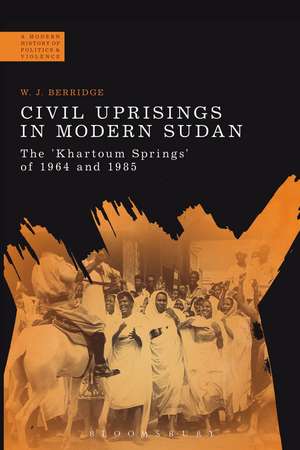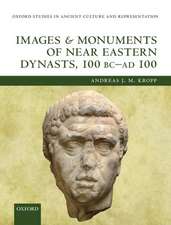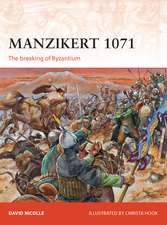Civil Uprisings in Modern Sudan: The 'Khartoum Springs' of 1964 and 1985: A Modern History of Politics and Violence
Autor Dr W. J. Berridgeen Limba Engleză Paperback – 27 iul 2016
| Toate formatele și edițiile | Preț | Express |
|---|---|---|
| Paperback (1) | 258.77 lei 6-8 săpt. | |
| Bloomsbury Publishing – 27 iul 2016 | 258.77 lei 6-8 săpt. | |
| Hardback (1) | 775.02 lei 6-8 săpt. | |
| Bloomsbury Publishing – 28 ian 2015 | 775.02 lei 6-8 săpt. |
Preț: 258.77 lei
Preț vechi: 331.86 lei
-22% Nou
Puncte Express: 388
Preț estimativ în valută:
49.53€ • 53.82$ • 41.63£
49.53€ • 53.82$ • 41.63£
Carte tipărită la comandă
Livrare economică 21 aprilie-05 mai
Preluare comenzi: 021 569.72.76
Specificații
ISBN-13: 9781474298667
ISBN-10: 1474298664
Pagini: 304
Dimensiuni: 156 x 234 x 16 mm
Greutate: 0.43 kg
Ediția:NIPPOD
Editura: Bloomsbury Publishing
Colecția Bloomsbury Academic
Seria A Modern History of Politics and Violence
Locul publicării:London, United Kingdom
ISBN-10: 1474298664
Pagini: 304
Dimensiuni: 156 x 234 x 16 mm
Greutate: 0.43 kg
Ediția:NIPPOD
Editura: Bloomsbury Publishing
Colecția Bloomsbury Academic
Seria A Modern History of Politics and Violence
Locul publicării:London, United Kingdom
Caracteristici
Uses interviews, archival research and primary source material in the Arabic language as part of a highly original study
Notă biografică
W. J. Berridge is Lecturer in Global History at the University of Northampton, UK.
Cuprins
Introduction 1. The October Revolution: Interrogating the Causality of the 1964 Uprising 2. The April Intifada of 1985: Civilian Uprising or a Dictator's Self-Destruction? 3. The Participation of Sudan's Political Parties in the Two Uprisings 4. The 'Modern Forces': Students, Professionals and Labour Unions in 1964 and 1985 5. The Role of the 'Security Forces': Protectors of the People or Hijackers of the Revolution? 6. The 1964-5 Transitional Regime and the Disintegration of Professional Unity 7. The 1985-6 Transitional Period and the Tenacity of Political Islam 8. The Legacy of 1964 and 1985 ConclusionGlossary of Arabic Terms Bibliography Index
Recenzii
[An] outstanding contribution to a strong tradition of Sudanese history.
Berridge has dug deeply into contemporary Arabic- and English-language accounts of the revolutions and the short democratic periods that followed them, and conducted an impressive number of interviews with the students, trade unionists, lawyers, politicians and soldiers who played prominent roles in 1964 and 1985 ... [The book] stands as the definitive account of two curiously overlooked revolutions
An exceptional book which, notwithstanding a mass of detail, makes the reader want to know more.
The uprisings have been mythologized more than they have been rigorously documented and analyzed. W.J. Berridge's superb book fills that gap ... [He] scrupulously avoids the risk of writing history backwards: the stories of these uprisings and their sequelae are recounted with the historian's eye to the contingencies of events and the uncertainties facing the protagonists ... This is a fine book: modern history at its best.
In contrast to more recent, well-documented uprisings in Sudan, which have resulted in UN indictments against the current president, this political history recounts two previous popular revolts with more positive outcomes . Through mining interviews, archival material, and newspaper accounts, mostly in the Arab vernacular, Berridge considers the two political cycles, analyzing the roles played by the Muslim Brotherhood, the Communist and other political parties, as well as the universities. The result is a detailed, informative account of these relatively underreported and little-understood political events for the English-speaking world. In the conclusion of this admirable study, Berridge raises the questions of why this cycle repeated itself and why the Sudan has not had a more recent Arab Spring. Summing Up: Highly recommended. Upper-division undergraduates and above.
Well-researched and detail-oriented ... a useful resource for those interested in Sudanese contemporary political history.
Berridge's analysis of the Sudanese revolutions provides significant insights into the political processes of revolution and civilian protest. This book should be an important resource for anyone who wants to go beyond general theories to an understanding of the actual dynamics of secular and religious politics in the Muslim world in both the 20th and the 21st centuries.
The important question as to why Sudan is left out of discussions of the Arab Spring, despite its two successful democratic uprisings against military rule in 1964 and 1985, is addressed in detail. Berridge adds important documentation of these historic revolutions to the decades of scholarly acknowledgement of Sudan's multiple marginality in both the Arab world and in Africa, too African to be Arab and too Arab to be African.
This superb book is a thorough study of two popular Sudanese revolutions in 1964 and 1985 that restored liberal democracy after the removal of entrenched military dictatorships.It is hoped that Civil Uprisings in Modern Sudan's rediscovery of the dynamics of Sudan civil society comprising unionism, incessant imagining of the nation, civil disobedience, general strikes, youthful martyrs, songs of revolutionary passion, national debates of Islamism, Marxism, traditionalism, modernity, and secularism will retool the on-going efforts to bring peace to the country.
Berridge has dug deeply into contemporary Arabic- and English-language accounts of the revolutions and the short democratic periods that followed them, and conducted an impressive number of interviews with the students, trade unionists, lawyers, politicians and soldiers who played prominent roles in 1964 and 1985 ... [The book] stands as the definitive account of two curiously overlooked revolutions
An exceptional book which, notwithstanding a mass of detail, makes the reader want to know more.
The uprisings have been mythologized more than they have been rigorously documented and analyzed. W.J. Berridge's superb book fills that gap ... [He] scrupulously avoids the risk of writing history backwards: the stories of these uprisings and their sequelae are recounted with the historian's eye to the contingencies of events and the uncertainties facing the protagonists ... This is a fine book: modern history at its best.
In contrast to more recent, well-documented uprisings in Sudan, which have resulted in UN indictments against the current president, this political history recounts two previous popular revolts with more positive outcomes . Through mining interviews, archival material, and newspaper accounts, mostly in the Arab vernacular, Berridge considers the two political cycles, analyzing the roles played by the Muslim Brotherhood, the Communist and other political parties, as well as the universities. The result is a detailed, informative account of these relatively underreported and little-understood political events for the English-speaking world. In the conclusion of this admirable study, Berridge raises the questions of why this cycle repeated itself and why the Sudan has not had a more recent Arab Spring. Summing Up: Highly recommended. Upper-division undergraduates and above.
Well-researched and detail-oriented ... a useful resource for those interested in Sudanese contemporary political history.
Berridge's analysis of the Sudanese revolutions provides significant insights into the political processes of revolution and civilian protest. This book should be an important resource for anyone who wants to go beyond general theories to an understanding of the actual dynamics of secular and religious politics in the Muslim world in both the 20th and the 21st centuries.
The important question as to why Sudan is left out of discussions of the Arab Spring, despite its two successful democratic uprisings against military rule in 1964 and 1985, is addressed in detail. Berridge adds important documentation of these historic revolutions to the decades of scholarly acknowledgement of Sudan's multiple marginality in both the Arab world and in Africa, too African to be Arab and too Arab to be African.
This superb book is a thorough study of two popular Sudanese revolutions in 1964 and 1985 that restored liberal democracy after the removal of entrenched military dictatorships.It is hoped that Civil Uprisings in Modern Sudan's rediscovery of the dynamics of Sudan civil society comprising unionism, incessant imagining of the nation, civil disobedience, general strikes, youthful martyrs, songs of revolutionary passion, national debates of Islamism, Marxism, traditionalism, modernity, and secularism will retool the on-going efforts to bring peace to the country.































